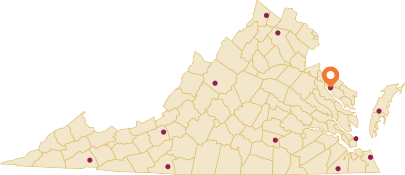Eastern Virginia Agricultural Research and Extension Center
ID
AREC-69NP (AREC-296NP)
EASTERN VIRGINIA
Agricultural Research and Extension Center

The booming craft malting and brewing industry in the United States has increased the demand for locally produced barley malt. The small grains breeding program at Virginia Tech has worked to help build a local supply chain for malting barley in the eastern US by developing new malting barley varieties specifically adapted to the Mid-Atlantic region. The barley breeder, Wynse Brooks, made the first malt crosses in 2010, and those efforts have come to fruition with the new malt barley variety, Avalon.
Publicly released in 2020, Avalon is the first two-row winter malt barley specifically bred for the Eastern US, and has since been recommended by American Malt Barley Association. We are currently working with local growers, maltsters and brewers, including Wheatland Spring Farm + Brewery and Murphy and Rude Malting Co., to conduct on-farm trials of new experimental malt barley breeding lines.
With funding from the SmartFarm Initiative at the Center for Advanced Innovation in Agriculture, the AREC is also working to incorporate high-dimensional genomics and high-throughput phenotyping into our malt barley breeding pipeline.
New malting barley varieties will need to be developed to help the malt supply chain to persist and thrive in a changing climate. Incorporating these new technologies will lead to accelerated malt variety development and provide unique malting seed products to regional farmers, maltsters, and brewers.

“We are really excited to be an integral part of the growing malt supply chain here in Virginia and the Mid-Atlantic. We believe that this market has the potential to produce excellent brewing and distilling products from malt grown right here in the eastern US.”
NICHOLAS SANTANTONIO
ASSISTANT PROFESSOR
SMALL GRAINS BREEDING & GENETICS
SCHOOL OF PLANT & ENVIRONMENTAL SCIENCES

“JoMar and our customers have greatly benefitted from our relationship with the Eastern Virginia AREC. Year to year, this is one of the best (if not the best) wheat trials that we have. We trust the data and it assists us in making proper advancements. The execution of excellence is a staple of the Eastern Virginia AREC.”
BRYAN GERARD
PRESIDENT, JOMAR SEEDS
EASTERN VIRGINIA AREC AT A GLANCE

DISCIPLINES
- Small grain breeding and variety testing
- Soybean breeding and variety testing
- Soybean and wheat agronomics
INNOVATIVE TECHNOLOGIES
- Drones and sensors for nutrient management and high throughout phenotyping
- In-field digital data collection
- Real-time weather data accessible via smartphone app
FACILITIES
- 215 acres of crop land
- Access to irrigation
- Modern seed lab and shop space
INDUSTRY PARTNERS
- Small grain and soybean industries
- Small grain and soybean commodity boards
ABOUT THE EASTERN VIRGINIA AREC
The Eastern Virginia AREC in Warsaw, Virginia, was established in 1912 and serves Virginia’s grain and soybean industries through research and educational programs leading to improved varieties and crop management practices. Our research objectives are to support the Virginia Tech small grain and soybean breeding programs, along with other research programs, that contribute to economically and environmentally sound crop production in Virginia and across the nation.
A COLLABORATIVE NETWORK
The ARECs are a network of 11 centers strategically located throughout the state that emphasize close working relationships between Virginia Agricultural Experiment Station, Virginia Cooperative Extension, and the industries they work with. The mission of the system is to engage in innovative, leading-edge research to discover new scientific knowledge and create and disseminate science-based applications that ensure the wise use of agricultural, natural, and community resources while enhancing quality of life.

PARTNER WITH US
2229 Menokin Road Warsaw, Virginia 22572
(804) 333-3485
www.arec.vaes.vt.edu/arec/eastern-virginia
VTEVAREC
@VT_EVAREC


Virginia Cooperative Extension materials are available for public use, reprint, or citation without further permission, provided the use includes credit to the author and to Virginia Cooperative Extension, Virginia Tech, and Virginia State University.
Virginia Cooperative Extension is a partnership of Virginia Tech, Virginia State University, the U.S. Department of Agriculture, and local governments. Its programs and employment are open to all, regardless of age, color, disability, sex (including pregnancy), gender, gender identity, gender expression, genetic information, ethnicity or national origin, political affiliation, race, religion, sexual orientation, or military status, or any other basis protected by law.
Publication Date
January 1, 2024



